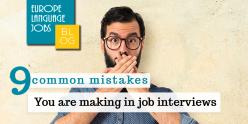Body language is everything in an interview.
You can be armed with the most eloquently produced oral pitch, CV and bucketloads of experience, but your gestures and posture etc. can still let you down at the crucial moment. In fact, you are actually saying more with your body than with words, according to Albert Mehrabian from UCLA (University of California, Los Angeles), who claims that 55% of the messages the brain receives come from a person’s body language.
Self-reflection and seeking advice from someone else could help you notice errors you’re making that maybe you struggled to notice previously. But choose someone honest and who also has your best interests in mind; if not, they’re unlikely to give you a sincere answer.
Remember that recruiters generally decide after 90 seconds if they’re going to hire someone, so to give yourself the best chance of a first impression, you should make sure you’re dressed well, clean, and well-groomed.
Here are some of the key aspects of the interview that generally let people down on the first impression:
Smile: Smiling expresses many positive emotions and character traits at the same time. These include gratitude for the opportunity, openness, confidence, friendliness, and charisma. Also, believe it or not, smiling will also help to relax you and relieve any nerves.
Like everything, it’s about getting the balance right, because grinning like the Cheshire Cat is going to creep the interviewer out.
Handshake: Everyone always talks about that all-important “firm handshake” and as essential as that is, many people take that advice as “don’t stop until you hear bones crack”. Squeezing too hard can come across as extremely aggressive, but at the same time, offering the interviewer a limp, lifeless hand will be a big turn off so, again, get the balance right.
Voice level: Don’t try to appear overly confident by screaming. Often the only real advice people receive before going into an interview is just to be confident. While that is great advice, without real self-awareness, overcompensating for lack of confidence by speaking loudly and quickly can come across as aggressive or even arrogant.
Equally, don’t let your nerves shy you into mumbling incomprehensibly.

More generally, and yet essential, here are the main things to bear in mind throughout the interview:
Posture
The manner in which you hold yourself will either make or break your chances of passing through to the next stage. Entering the interview with your head held high and your shoulders back has already put you ahead of the guy who went into the room staring at his shoes.
Good stance should be maintained when sitting down, too. Sitting with your back straight (without looking too stiff) and not perching on the edge of your chair will give the interviewer the impression that you are listening and attentive.
Maybe lean in a little but only to emphasize a strong point or gto give the impression of listening with extra interest, but try not to dive over the desk.
Top tip: Don’t cross your arms.
Gestures
What you do with your body throughout the interview gives off signals and clues as to what you’re like or what is going on inside your head. People who regularly interview candidates are experts in reading these signs, so make sure you give them the right ones.
What you do with your hands is crucial. Fidgeting is a big no-no. Many non-native English speakers could be easily forgiven for never having heard this word before - it basically means playing or fiddling with your hands restlessly. Many of us fidget constantly in our everyday lives, but keeping a lid on it during an interview would be a good idea, as it comes across as nervous and hyperactive.
However, do use your hands when speaking. Use gestures to emphasize your passion and give the conversation a more visual and memorable place in the interviewer’s mind. Showing your palms with hand gestures demonstrates openness – but don’t make it obvious. Nod intermittently and slowly when listening.
Mimicry
Like all of these topics, mimicking the interviewer is a very effective practice when done skillfully and subtly. Going overboard can be awkward and might be perceived like you’re either overly nervous or even worse - that you are making fun of the person interviewing you.
Honing into the person’s mood, voice tone and manner of moving, and taking on these traits is a real skill, but if you can manage it, then the interviewer is likely to feel a connection with you without necessarily even knowing why.
For example, imagine you have a high-status interviewer, who is quiet, serious, very formal, and traditional. You’re probably intimidated. His or her movements will be slow, their voice quiet, eye contact may be minimal, and when it does occur, it will be intense. Bouncing into the room, hand outstretched with an exaggerated grin on your face, will not go down well.
At the other end of the scale, if you have a really friendly, enthusiastic, and energetic interviewer who clearly doesn’t want you to feel intimidated, then this kind of entrance may be received as encouraging enthusiasm. Gauge your interviewer.

Eye Contact
Maintaining a good and professional conversation is impossible without good eye contact. If your gaze keeps darting around the room, then the person on the other side of the desk will only assume that your attention is elsewhere or that you are too nervous to look at them.
Getting involved in an insistent staring competition with the interviewer because your mum told you to make eye contact is not advised, either. The eyes are a window into your level of interest and certain things happen when you’re genuinely excited or engaged with a subject. Your pupils dilate and your eyes “light up”, as we say. So if you are especially interested in one of the topics discussed, then communicate it through your eyes!
Facial Expression
You must match your facial expression with the things you’re saying. Sitting with a stern look on your face as you describe your life passions may come across as vacant, bored or, even worse, boring. Meanwhile, in your head, you imagine your expression to be professional and formal. These all apply for Skype interviews as well!
Be human. Follow the conversation and act naturally.
Put the Art in Depart
Ok, you have reached the end of the interview. Everything went smoothly and now you’re eager to get out of the room before anything goes wrong. The worst thing you can do is express this perfectly natural eagerness to leave. Moving to stand up or darting for the door too quickly can be damaging to the good impression you’ve made. Get up from the chair slowly, as if you’d be more than happy to continue talking to them for hours.
Take your time in thanking them and continuing the conversation to the door (assuming the interviewer goes to the door with you) is a great way to keep the natural flow going and avoid any last-minute awkward silences. Maybe refer to something that you particularly bonded over in the interview, but don’t ruin everything by asking a stupid question!
Check out this great infographic from our friends at take lessons!
Not quite at the interview stage yet? Register at Europe Language Jobs to find the dream job in your ideal European location.









Andreas Philippou1y ago
pretty useful
pretty useful